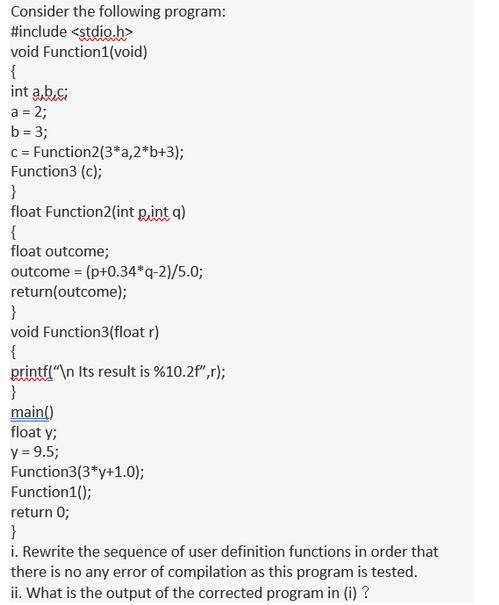Question
Consider the following program: #include void Function1(void) { int ab.c a = 2; b = 3; c = Function2(3*a, 2*b+3); Function3 (c); } float

Consider the following program: #include void Function1(void) { int ab.c a = 2; b = 3; c = Function2(3*a, 2*b+3); Function3 (c); } float Function2(int p int q) { float outcome; outcome = (p+0.34*q-2)/5.0; return(outcome); } void Function3(float r) { printf(" Its result is %10.2f",r); } main() float y; y = 9.5; Function3 (3*y+1.0); Function1(); return 0; } i. Rewrite the sequence of user definition functions in order that there is no any error of compilation as this program is tested. ii. What is the output of the corrected program in (i) ?
Step by Step Solution
There are 3 Steps involved in it
Step: 1
The C program provided in the image has several issues related to function declaration definition and the sequence in which they appear Here are the p...
Get Instant Access to Expert-Tailored Solutions
See step-by-step solutions with expert insights and AI powered tools for academic success
Step: 2

Step: 3

Ace Your Homework with AI
Get the answers you need in no time with our AI-driven, step-by-step assistance
Get StartedRecommended Textbook for
Income Tax Fundamentals 2013
Authors: Gerald E. Whittenburg, Martha Altus Buller, Steven L Gill
31st Edition
1111972516, 978-1285586618, 1285586611, 978-1285613109, 978-1111972516
Students also viewed these Programming questions
Question
Answered: 1 week ago
Question
Answered: 1 week ago
Question
Answered: 1 week ago
Question
Answered: 1 week ago
Question
Answered: 1 week ago
Question
Answered: 1 week ago
Question
Answered: 1 week ago
Question
Answered: 1 week ago
Question
Answered: 1 week ago
Question
Answered: 1 week ago
Question
Answered: 1 week ago
Question
Answered: 1 week ago
Question
Answered: 1 week ago
Question
Answered: 1 week ago
Question
Answered: 1 week ago
Question
Answered: 1 week ago
Question
Answered: 1 week ago
Question
Answered: 1 week ago
Question
Answered: 1 week ago
Question
Answered: 1 week ago
Question
Answered: 1 week ago
Question
Answered: 1 week ago
View Answer in SolutionInn App



